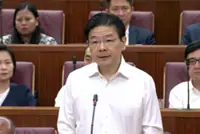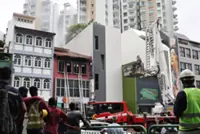
Pope Francis and President Tharman Shanmugaratnam at the University Cultural Centre. Tharman said the pontiff has consistently called for efforts to promote harmony and dialogue between different groups and faiths. - ST
SINGAPORE: Singapore has prospered while striving to build a society that values social justice and the common good, said Pope Francis on Thursday (Sept 12).
Speaking in Italian at a state address held at the National University of Singapore’s University Cultural Centre, he praised the Republic’s policies on public housing, education and healthcare, which he said demonstrated the Government’s commitment to improving the lives of its citizens.
But he also warned of the risk in focusing solely on pragmatism or “placing merit above all things”, which could lead to the unintended consequence of justifying the exclusion of those on the margins from Singapore’s progress.
The 87-year-old pontiff was addressing an 800-strong audience including former presidents Tony Tan and Halimah Yacob, Cabinet ministers, members of the diplomatic corps, government officials, representatives from civil society, inter-religious organisations and social services agencies, as well as students.
Before that, he had received a ceremonial welcome at Parliament House and had an orchid named in his honour. He also called on President Tharman Shanmugaratnam and met Prime Minister Lawrence Wong.
Delivering his speech, Pope Francis, who is head of the Vatican City state, commended the various policies and initiatives put in place to support the most vulnerable in society.
In recent years, Singapore has introduced schemes such as ComLink+ to uplift lower-income families and provide them stability and social mobility, as well as boosted the Workfare Income Supplement for lower-wage workers.
The Pope said he hoped that special attention would be paid to the poor and the elderly, whose labours have laid the foundation for Singapore today.
He also called for Singapore to protect the dignity of migrant workers.
“These workers contribute a great deal to society and should be guaranteed a fair wage,” he said.
Racial and religious harmony was another topic the Pope touched on during his address.
Describing Singapore as a mosaic of ethnicities, cultures and religions living together in harmony, he said this state of affairs was facilitated by the impartiality of public authorities that engage in constructive dialogue with all.
Mutual respect, cooperation, dialogue and the freedom to exercise one’s beliefs have made it possible for everyone to make his or her own unique contribution to the common good, and also prevent extremism and intolerance from taking root, he added.
President Tharman, who spoke before Pope Francis, said the pontiff has consistently called for efforts to promote harmony and dialogue between different groups and faiths.
Singaporeans treasure being in a country where various ethnic and religious communities live together peacefully, and the Constitution enshrines their protection from discrimination, as well as ensures that racial harmony is promoted, he said.
Diversity is embraced in Singapore and defines the nation’s identity, Mr Tharman said, adding that the country’s religious communities have each played its part to make this unusual circumstance possible.
“It is ultimately this spirit of openness, mutual accommodation and respect that allows different religious communities to thrive in Singapore. None of this came naturally. It has been the work of nation-building over decades,” he added.
Noting that racial and religious harmony is not immutable, Tharman said there is a need to build deeper understanding, strengthen interactions between different ethnic and religious groups, and actively weaken the ground for forces that seek to pull communities apart.
The International Conference on Cohesive Societies that Singapore convenes seeks to contribute thinking on this front, he said, thanking the Vatican for its regular and active participation.
The Pope, who is only the second pontiff to visit Singapore after Pope John Paul II in 1986, added that his trip comes 43 years after Singapore and the Vatican officially established diplomatic relations.
The purpose of his visit was not only to help Catholics confirm their faith, but also to encourage them to “continue, with joy and dedication, their cooperation with all men and women of good will in building a healthy and cohesive civil society for the sake of the common good”, he added.
From the very beginning of its presence in Singapore, since the 1800s, the Catholic Church has contributed to the progress of the nation in the areas of education, healthcare and charity, he said.
He added that the church has also constantly promoted inter-religious dialogue and cooperation between communities of different faiths.
Turning to international affairs, the Pope welcomed Singapore’s promotion of multilateralism and a rules-based order.
The Republic has a specific role to play at the international level, with the world threatened by conflicts and wars that have spilt much blood, he added.
“I encourage you to continue to work in favour of the unity and fraternity of humanity and the common good of all peoples and all nations, in a way that does not exclude others or is restricted to your national interests,” he said.
In addition, Singapore can also have an impact in an era of environmental crisis, Pope Francis said, suggesting that the Republic’s search for innovative solutions to address environmental challenges can encourage other countries to do the same.
In his speech, Tharman said the Pope’s vision on the interconnectedness of all life and his calls for countries to take action on climate change have inspired many.
“This message is all the more relevant as the world struggles to meet growing energy demand while achieving a transition to clean energies... a world that must feed a rapidly growing population while avoiding further environmental degradation,” he said.
Singapore, as a small city-state, has sought to balance development with environmental responsibility since independence, he added, citing the greening of the city and conservation of water through recycling of used water and desalination.
The Singapore Green Plan 2030 serves as a guide to counter climate change, and the Republic’s approach is underpinned by science, Tharman said.
The Pope also touched on the topic of family in his address, saying that it is where everyone first learns to relate to others, and learns to love and be loved.
Yet the foundations on which families are built are being challenged by current social conditions and run the risk of being weakened, he said.
“Families must be allowed to transmit the values that give meaning and shape to life and to teach young people how to form solid and healthy relationships,” he added.
“Efforts to promote, protect and support family unity through the work of various institutions are therefore to be commended.”
On the use of technology, Pope Francis said sophisticated technologies of the digital age, like artificial intelligence, should be used to promote understanding so people can come closer together, and not to isolate them.
Wrapping up his speech, he said he hoped Singapore will continue on its current path, as a “shining example of what humanity can achieve by working together in harmony, with a sense of responsibility and a spirit of inclusiveness and fraternity”.
Later in the afternoon, the Pope celebrated mass for more than 50,000 people, who had gathered at the National Stadium for the climax of his three-day trip here.
In his homily, delivered in Italian with English subtitles shown on screens, the Pope spoke on the importance of love as the driving force behind good works.
As he saw it, behind each of the works in Singapore were stories of love – of people united with one another in a community, of citizens dedicated to their country, of mothers and fathers concerned for their families, and of workers and professionals sincerely engaged in their roles and tasks.
Without love, there is “no life, no impetus, no reason to act, no strength to build”, he said.
“If there is anything good that exists and endures in this world, it is only because, in innumerable situations, love has prevailed over hate, solidarity over indifference, generosity over selfishness.” - The Straits Times/ANN



































